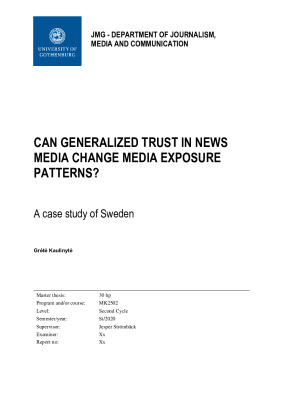CAN GENERALIZED TRUST IN NEWS MEDIA CHANGE MEDIA EXPOSURE PATTERNS?
A case study of Sweden
The purpose of this thesis is to investigate the relationship between trust in news media and (1) exposure to mainstream news media, (2) exposure to online or social media for news, (3) intentional news avoidance and (4) exposure to attitude-consistent and counter-attitudinal alternative political media.
Theory: Media trust, uses and gratifications, alternative media, selective exposure and motivated reasoning theories.
Method: Principal components analysis, correlation analysis, multiple regression analysis
Result: Generalized trust in news media positively associates with the exposure to some of mainstream news media sources (quality newspapers and public broadcasting service TV news programs), but it does not significantly associate with the exposure to tabloids or commercial channel’s TV news. Generalized trust in news media negatively associates with the exposure to online or social media for news and with the intent to avoid the news, while the intent to avoid the news relates to lower exposure to PBS TV news. Generalized trust in news media negatively associates with exposure to attitude-consistent alternative political media among right-wing respondents but does not correlate to exposure to attitude-consistent alternative political media among left-wing respondents. Finally, generalized trust in news media significantly negatively relates to exposure to counter-attitudinal alternative political media among both left-wing and right-wing respondents’ groups.

